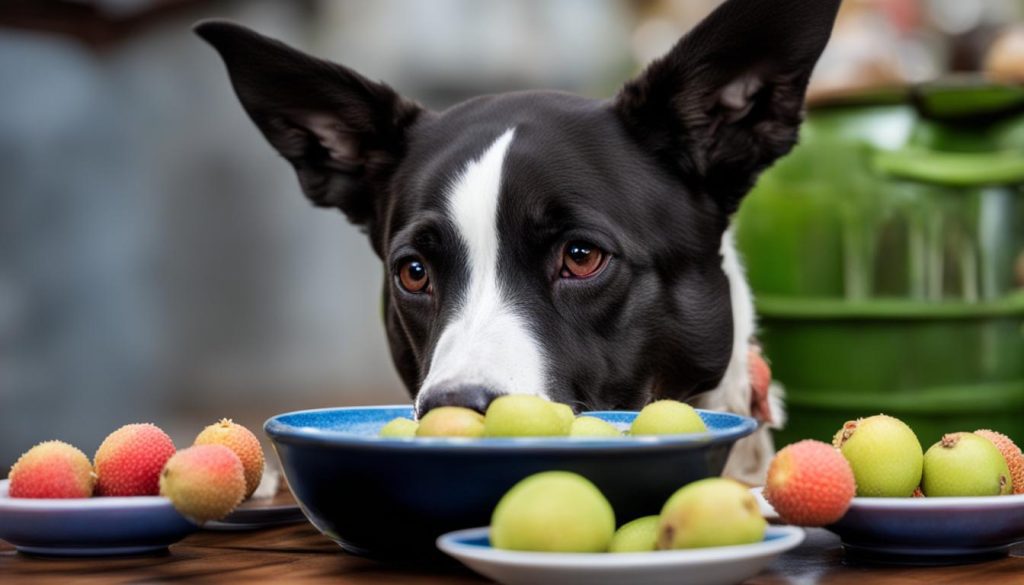As a responsible dog owner, you may often wonder if it is safe to share your favorite fruits with your furry companion. Today, I want to address a question that many pet owners ask: Can dogs eat lychee?
The short answer is yes, dogs can technically eat lychee. However, it is important to exercise caution when feeding them this exotic fruit. While lychee may offer some potential benefits, there are also risks and precautions to consider.
Can Dogs Eat Lychee? The short answer is yes, but it is not recommended.
- Lychee is not recommended by veterinarians for dogs due to potential risks.
- Unripe lychee can be toxic for both humans and animals.
- Lychee skin and seeds can pose choking hazards and cause intestinal blockages.
- Consult with a veterinarian before introducing lychee or any new food into your dog’s diet.
- If your dog shows symptoms of lychee poisoning, seek immediate veterinary care.
Why Is Lychee Bad For Dogs?
Lychee can be harmful to dogs for several reasons. Firstly, unripe lychee contains a specific amino acid that can have a negative effect on blood glucose levels, potentially causing serious health issues. Additionally, the rough skin and large seed of the lychee fruit can present a choking hazard and may cause intestinal blockages if ingested. Dogs should also avoid lychee seeds as they contain a substance called saponin, which is poisonous to both humans and animals.
If a dog consumes unripe lychee, it can lead to a sudden drop in blood sugar levels, which can be dangerous. Symptoms of low blood sugar levels may include weakness, lethargy, disorientation, seizures, and even coma. Therefore, it is important to keep lychee out of reach and ensure that your dog does not accidentally consume any unripe or spoiled fruit.
The Dangers of Lychee Seeds
Lychee seeds should be avoided by dogs at all costs. These seeds are toxic as they contain a substance called saponin. When ingested, saponin can cause vomiting, diarrhea, abdominal pain, and gastrointestinal irritation. In severe cases, it can result in organ failure and even death. Therefore, it is crucial to remove the seeds from lychee fruit before offering it to your furry companion.
Choking Hazard and Intestinal Blockages
The rough skin and large size of the lychee fruit can pose a choking hazard to dogs, especially small or toy breeds. If a dog accidentally swallows a large piece of lychee skin or fruit without proper chewing, it can get stuck in the esophagus or cause an obstruction in the intestines. This can lead to discomfort, pain, and require emergency medical intervention.
Extra Precautions with Lychee Jelly
While some pet owners may wonder if it’s safe to feed their dogs lychee jelly, it’s important to note that this sweet treat is also not recommended. Lychee jelly often contains high amounts of added sugars, artificial flavors, and preservatives, which can be harmful to dogs. Consumption of sugary foods can contribute to weight gain, dental issues, and even diabetes in dogs. It’s best to stick to feeding your dog fresh, natural fruits without any added sugars or sweeteners.
What Should I Do If My Dog Eats Lychee?
If your dog ingests unripe lychee or has access to lychee fruit, it is important to monitor their symptoms and seek veterinary care immediately if any signs of poisoning occur. Quick action and prompt veterinary care can increase the chances of a dog’s recovery from lychee poisoning.
Symptoms of lychee poisoning in dogs may include:
- Dark urine
- Extreme drooling
- Muscle spasms
- Seizures
- Stomach cramps
- Vomiting
If you notice any of these symptoms or suspect that your dog has eaten lychee, it is crucial to contact your veterinarian immediately. They will be able to provide appropriate veterinary care and guidance to ensure your dog’s well-being.

Can Dogs Eat Lychee Fruit?
Dogs can enjoy small amounts of ripe lychee fruit, but it should be given sparingly as an occasional treat. The flesh of the lychee fruit contains beneficial vitamins and minerals, such as vitamin C, calcium, phosphorus, and potassium, which can contribute to your dog’s overall health. However, it is important to exercise caution when feeding dogs lychee due to its high sugar content. Too much sugar can lead to weight gain, obesity, and even diabetes in dogs.
When giving lychee to your dog, it is essential to remove the skin and seeds, as they can present choking hazards and potential digestive issues. By offering your furry friend only the ripe flesh of the fruit, you can provide a tasty and nutritious treat without the associated risks. Remember to limit the amount of lychee given to your dog and incorporate it as an occasional addition to their diet.
Are Lychees Poisonous To Dogs?
When it comes to lychees and dogs, the fruit is not generally considered to be poisonous. However, there are some potential risks and harmful effects that dog owners should be aware of before feeding their furry friends this tropical treat.
The skin and seeds of lychees can pose choking hazards and potential digestive blockages in dogs. To prevent any accidents, it is best to remove the skin and seeds before giving lychee fruit to dogs. This ensures that they can enjoy the flesh of the fruit without any potential hazards.
Furthermore, while lychees are not toxic to dogs, their high sugar content can lead to health problems if consumed in excess. It is important to keep in mind that a dog’s diet should be balanced and should not consist of excessive amounts of sugary fruits like lychee.
Overall, while lychees are not inherently poisonous to dogs, it is important to exercise caution when feeding them to your furry friend. By removing the skin and seeds and moderating their intake due to the high sugar content, you can enjoy the lychee fruit without putting your dog at unnecessary risk.

Can Dogs Eat Lychee Nuts?
Dogs should not eat lychee nuts or seeds. The seeds of lychee contain a compound called hypoglycin A1, which can cause hypoglycemic encephalopathy in severe cases. Ingesting lychee pits can lead to a dangerous build-up of this compound in the dog’s body, resulting in serious health risks.
It is important to remove the seeds before giving lychee fruit to dogs.
- The seeds of lychee contain hypoglycin A1, which can cause hypoglycemic encephalopathy in dogs.
- Ingesting lychee pits can lead to the dangerous build-up of hypoglycin A1 in the dog’s body.
- Removing the seeds before giving lychee fruit to dogs is essential for their safety.
Can Dogs Eat Lychee Jelly?
Dogs should not consume lychee jelly or any sugary foods. Lychee jelly is high in added sugar, which can contribute to weight gain, diabetes, and other health issues in dogs. It is best to stick to giving dogs the actual fruit without any added sugars or sweeteners.
Conclusion
It is important to consider the potential risks associated with dogs eating lychee. Although dogs can technically consume ripe lychee flesh as a treat, it is advisable to exercise caution due to the choking hazards and digestive blockages that the skin and seeds may present. Veterinarians generally do not recommend feeding lychee to dogs, so it is best to consult with a professional before introducing this fruit or any new food into your dog’s diet.
While lychee does contain beneficial vitamins and minerals, it is important to remember that it is also high in sugar. Giving lychee to dogs in large quantities can contribute to obesity and diabetes, so moderation is key. Always prioritize your dog’s overall health and well-being when making decisions about their diet.
If you suspect that your dog has consumed unripe lychee or shows any symptoms of poisoning, such as dark urine, extreme drooling, muscle spasms, seizures, stomach cramps, or vomiting, it is crucial to seek immediate veterinary care. Acting quickly can greatly increase the chances of a successful recovery.






